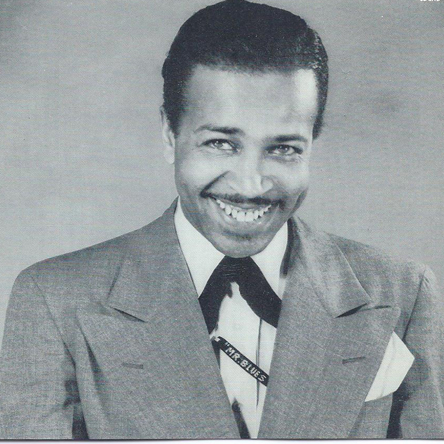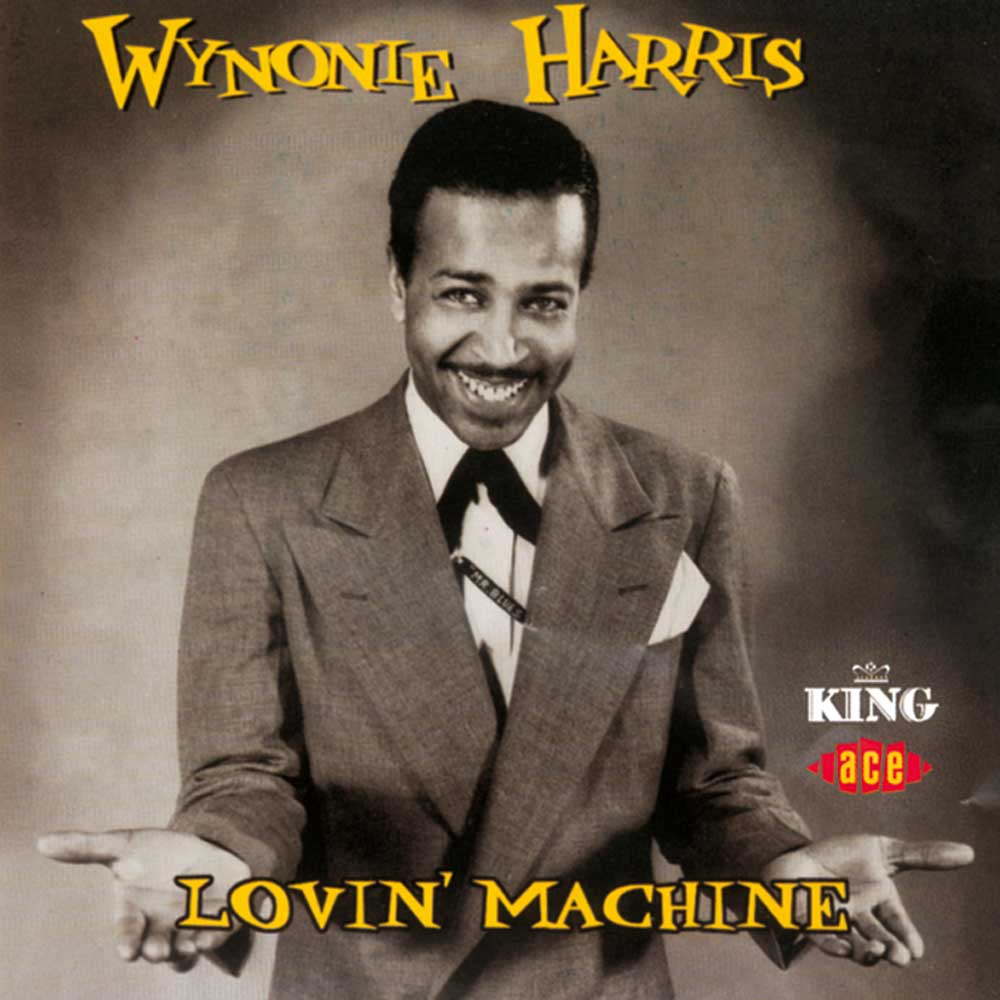WYNONIE HARRIS
Wynonie Harris (August 24, 1915– June 14, 1969), born in Omaha, Nebraska, was an American blues shouter and rhythm-and-blues singer of upbeat songs, featuring humorous, often ribald lyrics. He had fifteen Top 10 hits between 1946 and 1952. Harris is generally considered one of the forerunners of rock and roll. He influenced Elvis Presley, among others.
His dirty blues repertoire included "Lolly Pop Mama" (1948), "I Like My Baby's Pudding (1950), "Sittin on It All the Time" (1950), "Keep on Churnin'" (1952), and "Wasn't That Good" (1953).
Harris's mother, Mallie Hood Anderson, was fifteen and unmarried at the time of his birth. His paternity is uncertain. His wife, Olive E. Goodlow, and daughter Patricia Vest said that his father was a Native American named Blue Jay. Wynonie had no father figure in his family until 1920, when his mother married Luther Harris, fifteen years her senior.
In 1931, at age 16, Harris dropped out of high school in North Omaha. The following year his first child, a daughter, Micky, was born to Naomi Henderson. Ten months later, his son Wesley was born to Laura Devereaux. Both children were raised by their mothers. Wesley became a singer in the Five Echoes and in the Sultans. Later he became a singer and guitarist in Preston Love's band. Eventually, Wesley's grandson (Harris's great-grandson), Jourdan Devereaux, under the pseudonym "L Oquence" began a music career as a hip-hop artist.
In 1935 Harris, age 20, started dating 16-year-old Olive E. (Ollie) Goodlow, of Council Bluffs, Iowa, who came to neighboring Omaha to watch him perform. On May 20, 1936, Ollie gave birth to a daughter, Adrianne Patricia (Pattie). Harris and Ollie were married on December 11, 1936. Later they lived in the Logan Fontenelle projects in North Omaha. Ollie worked as a barmaid and nurse; Harris sang in clubs and took odd jobs. His mother was Pattie's main caretaker. In 1940, Wynonie and Ollie Harris moved to Los Angeles, California, leaving Pattie with her grandmother in Omaha.
Harris formed a dance team with Velda Shannon in the early 1930s. They performed in North Omaha's flourishing entertainment community, and by 1934 they were a regular attraction at the Ritz Theatre. In 1935 Harris, having became a celebrity in Omaha, was able to earn a living as an entertainer, in the depths of the Great Depression. While performing at Jim Bell's Club Harlem nightclub with Shannon, he began to sing the blues. He began traveling frequently to Kansas City, where he paid close attention to blues shouters, including Jimmy Rushing and Big Joe Turner.
His break in Los Angeles was at a nightclub owned by Curtis Mosby. It was here that Harris became known as "Mr. Blues".
With Lucky Millinder[edit]
During the 1942–44 musicians' strike, Harris was unable to pursue a recording career. Instead, he relied on personal appearances. Performing almost continuously, in late 1943 he appeared at the Rhumboogie Club in Chicago. Harris was spotted by Lucky Millinder, who asked him to join his band on tour. Harris joined on March 24, 1944, while the band was in the middle of a week-long residency at the Regal in Chicago. They moved on to New York City, where on April 7 Harris took the stage with Millinder's band for his debut at the Apollo Theatre, in Harlem. It was during this performance that Harris first publicly performed "Who Threw the Whiskey in the Well" (a song recorded two years earlier by Doc Wheeler's Sunset Orchestra).
After the band's stint at the Apollo, they moved on to their regular residency at the Savoy Ballroom, also in Harlem. Here, Preston Love, Harris' childhood friend, joined Millinder's band, replacing the alto saxophonist Tab Smith. On May 26, 1944, Harris made his recording debut with Lucky Millinder and His Orchestra. Entering a recording studio for the first time, Harris sang on two of the five cuts recorded that day, "Hurry, Hurry" and "Who Threw the Whiskey in the Well", for Decca Records . The embargo on shellac during World War II had not yet been rescinded, and release of the record was delayed.
Harris's success and popularity grew as Millinder's band toured the country, but he and Millinder had a falling out over money, and in September 1945, while playing in San Antonio, Texas, Harris quit the band. Three weeks later, upon hearing of Harris's separation from the band, a Houston promoter refused to allow Millinder's band to perform. Millinder called Harris and agreed to pay his asking price of one hundred dollars a night. The promoter reinstated the booking, but it was the final time Harris and Millinder worked together. Bull Moose Jackson replaced Harris as the vocalist in the band.
In April 1945, a year after the song was recorded, Decca released "Who Threw the Whiskey in the Well".[7] It became the group's biggest hit; it went to number one on the Billboard R&B chart on July 14 and stayed there for eight weeks. The song remained on the charts for almost five months, also becoming popular with white audiences.[8] an unusual feat for black musicians of that era. In California the success of the song opened doors for Harris. Since the contract with Decca was with Millinder (meaning Harris was a free agent), Harris could choose from the recording contracts with which he was presented.
In July 1945, Harris signed with Philo, a label owned by the brothers Leo and Edward Mesner. Harris' band was assembled by Johnny Otis, and the group recorded the 78rpm record "Around the Clock". Although not a chart-topper, the song became popular and was covered by many artists, including Willie Bryant, Jimmy Rushing and Big Joe Turner.
Harris went on to record sessions for other labels, including Apollo, Bullet and Aladdin. His greatest success came when he signed for Syd Nathan's King label, where he enjoyed a series of hits on the U.S. R&B chart in the late 1940s and early 1950s. These included a 1948 cover of Roy Brown's "Good Rocking Tonight", "Good Morning Judge" and "All She Wants to Do Is Rock". In 1946, Harris recorded two singles with pianist Herman "Sonny" Blount, who later earned fame as the eclectic jazz composer and bandleader Sun Ra.
In 1950, he released the double-sided hit, "Sittin' On It All the Time" b/w "Baby, Shame On You" (King 4330) and in 1951, he covered Hank Penny's "Bloodshot Eyes" (King 4461). His risque approach to material at times, made his tracks "Keep On Churnin'" (1952) and "Wasn't That Good" (1953) jukebox favorites in the early 1950s. Slightly earlier tracks including "I Want My Fanny Brown" and "Lollipop Mama", were other sides that Harris sang of a lascivious nature.
Harris transitioned between several recording contracts between 1954 and 1964. In 1960 he cut six sides for Roulette Records that included a remake of his hit "Bloodshot Eyes" as well as "Sweet Lucy Brown", "Spread the News", "Saturday Night", "Josephine" and "Did You Get the Message". He also became more indebted, and was forced to live in less glamorous surroundings.
In 1964 Harris resettled for the last time in Los Angeles. His final recordings were three sides which he did for the Chess Records label (in Chicago) in 1964: "The Comeback", "Buzzard Luck" and "Conjured". His final large-scale performance was at the Apollo, New York in November 1967, where he performed with Big Joe Turner, Big Mama Thornton, Jimmy Witherspoon and T-Bone Walker.
On June 14, 1969, aged 53, Harris died of esophageal cancer at the USC Medical Center Hospital in Los Angeles.
Pocos cantantes de blues encarnaban los buenos momentos que Wynonie Harris. "Mr. Blues", como era conocido, demostraba su garra relatando alegremente relatos de sexo, bebidas alcohólicas y fiestas interminables en su voz rasposa de marca registrada sobre algunos de los combos más potentes de la época de la posguerra. Él era ya bailarín, baterista, y cantante experimentados cuando dejó Omaha para LA en 1940 (sus influencias principales que eran Big Joe Turner y Jimmy Rushing). Encontró mucho trabajo cantando y apareciendo como un maestro de ceremonias en Central Avenue, la bulliciosa vida nocturna de la comunidad negra. La reputación de Harris se estaba extendiendo rápidamente - apareció en Chicago en el Rhumboogie Club en 1944 cuando el líder de la banda Lucky Millinder lo contrató como nuevo cantante de su banda.
En julio de 1945 debutó con el apoyo del baterista Johnny Otis, el saxista Teddy Edwards, y el trompetista Howard McGhee. Un mes más tarde, firmó con Apollo Records, una asociación que le dio dos grandes éxitos en 1946: "Wynonie's Blues" (con el combo de saxista Illinois Jacquet) y "Playful Baby".





Comentarios